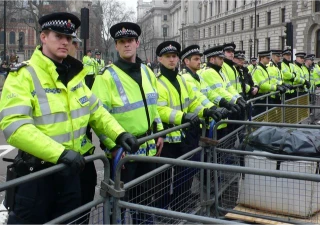Britain has been shaken by riots and violence for more than a week, as police clashed with crowds spouting anti-immigrant and Islamophobic slogans in cities and towns from Northern Ireland to the south coast of England.
The unrest began after right-wing activists used social media to spread misinformation about a knife attack in the seaside town of Southport, northwest England, that killed three girls aged six, seven, and nine, during a Taylor Swift-themed dance event on July 29.
Police have so far said the suspect is a 17-year-old man who was born in Cardiff, the capital of Wales, and lived in a village near Southport.
Thousands of anti-racism protesters took to the streets to counter a spate of far-right rallies planned to target immigration centers, seeming to thwart what looked set to be another day of rioting.
Prime Minister Keir Starmer, who has described the riots as “far-right thuggery,” said after an emergency meeting with law enforcement officials and government ministers Tuesday that perpetrators will swiftly be punished.
More than 400 people have been arrested so far due to violence in more than two dozen towns and cities and about 100 have been charged, after Starmer announced plans to ramp up the criminal justice system.
The government is calling on social media companies, such as Musk’s X, formerly known as Twitter, to do more to combat the spread of misleading and inflammatory information online.
But Elon Musk, the CEO of Tesla and owner of X, posted to the platform Sunday that “civil war is inevitable” in response to a post blaming the violent demonstrations on the effects of “mass migration and open borders.”
On Monday, a spokesperson for Starmer addressed Musk’s comment, telling reporters “there’s no justification for that.”
But Musk has refused to heed the calls to silence him.
Instead, on Tuesday, he labeled Starmer #TwoTierKier in an apparent reference to a debunked claim spread by conspiracy theorists and populist politicians such as Nigel Farage that “two-tier policing” means right-wing protests are dealt with more forcefully than those organized by the left. He also likened Britain to the Soviet Union for attempting to restrict offensive speech on social media.
Migration to Britain was a major factor in its 2016 vote to leave the European Union and it was a battleground during last month’s election, with Nigel Farage’s Reform Party winning around 4 million votes on calls for tighter border controls.
Britain saw record net migration levels in 2022, with numbers buoyed by those arriving from Ukraine and Hong Kong, and through work and student visas.
Net migration through legal means was some 685,000 in 2023, while 29,000 people arrived on small boats across the Channel, many having fled war zones. The far-right chants of “stop the boats” was also a slogan of the Conservative Party before it was swept out of power after 14 years at the election.
The 2011 riots, which engulfed London before spreading to other cities, were considered the worst week of public disorder to hit Britain for 200 years.
Then, like now, Starmer was involved in quelling the disturbances. In 2011, he was the director of public prosecutions who kept the courts open for 24 hours a day to process offenders and allowed magistrates to pass longer and tougher sentences.
This time, as prime minister, he has accused far-right agitators of mercilessly exploiting the deaths of the three girls to fuel attacks on asylum seekers and people of color.
The coming days and weeks will determine how Starmer deals with his first national challenge.
